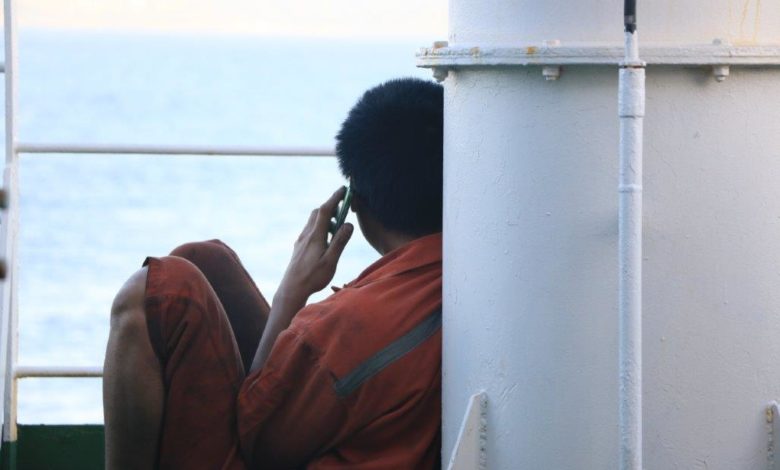Mental health and honey badgers: No laughing matter

Christian Ayerst, CEO of Mental Health Support Solutions, writes for Splash demanding organisational change ashore and at sea.
I’m a fairly tough guy. I can sleep for five hours – and be relatively lucid the next day. I run ultra-marathons. I’ve been bitten by a honey badger and lived to tell the tale.
But earlier this month I was struggling. A million things to do. Phones ringing. Someone needing something. It was my birthday. And I was sinking.
And then I think of the brave seafarers. Working six-hour shifts – all day, every day. No walks in the park to alleviate boredom. And living, working and walking on some of the most dangerous materials in the world.
Ask your organisation what they’re doing for those in offices and at sea
And their colleagues onshore. Phones buzzing. Explaining over a crackling line another contract extension to frustrated crew. A message from a worried partner asking when daddy will be home. All handled alone and at home.
It’s no wonder everyone is talking about mental health today.
But as an industry – do we really do enough? Frankly it doesn’t matter what I think. Ask the folk at the coalface. And I think the answer will be a shake of the head.
Why? Because I tell my colleagues” “I broke my leg crossing the road”. We chuckle about the little old lady carrying her groceries I heroically saved from the onrushing traffic.
But when I mention “waking up and wondering what’s the point of carrying-on”, of “thinking about ending it all” it’s suddenly not funny. The banter dries up. And I’m left alone.
The problem isn’t just opening up. We can all do that. But how do we respond to someone’s outpouring of emotion, or subtle signals that something isn’t right. Is it easier to ignore and hope it goes away? Or are we brave enough to engage?
And this is where the shipping industry must do better. Everyone – whether onboard or at sea – must know how to read the signs and respond properly when confronted by someone with mental health issues.
Every workplace should have a member of staff professionally trained in psychological first aid. No sensible person would work for a company where there isn’t a physical first aider in the office to help me when I lose a wrestle with a boiling kettle. In 2021 – the same must apply for mental health.
Everyone must have access to a psycho-medical professional at all times. I can call 112 and within minutes an ambulance is on-scene to tend my physical discomfort. But psychological illnesses? Absolutely nothing. Physical and mental health are one and the same – so why not treat them that way?
Let’s start early. From a young age everyone should be taught about mental health – what it means, what it looks like and how to manage it. And – importantly – how to interact with someone suffering. We should be brave and face our issues and those of others. At home, at school, university, academies, cadetship, in the office and onboard – let’s fully engage with the subject.
So what does 2021 hold for those onboard? Another year of fake news, postponed crew changes and uncertainty? Quite possibly.
But the silver lining to the cloud is mental health. Everyone’s talking about it. So let’s seize that momentum and make real change. Ask your organisation what they’re doing for those in offices and at sea. Challenge those who use the “we think our staff are happy” as an excuse to do nothing. And be proud to join the chorus of those demanding that those in charge of mental health practice what they preach.
And beware of honey badgers – they pack quite a punch.

As far back as the late 1960s I was a 4th Engineer on Eastern Service which meant being away from home for two and a half years. I felt ill but not ill enough to physically find anything apart from lower body trunk area discomfort. Nobody really wanted to know and I became very concerned and “down”. No help or discussion about what could be done until arriving in Japan where I requested to see a doctor. To cut a long story short I was operated on because my blood cells were out of ballance indicating an infection. They discovered my inflamed appendix inverted up under my rib cage. That sorted that out, but my ship departed without me, leaving me in a Japanese hotel with solitary thoughts. Loneliness and a lucky escape from peritonitis dwelt on my mind. Had it not been for the Pastors at the Mission to Seamen i would have been in a very dark place. Another ship from the same Company arrived a month later and I was back to normal, as “normal” as that lifestile was even in these days. What a difference a listening ear can make in situations like that. Someone in authority on board should be trained in counselling and have the authority to implement action, it is now well into the 21st century.
Of course this would mean increasing the manning levels when the trend for so long has been downward and no serious discussion in the industry to rectify this. Those who serve now are expected to multi-task in so many ways, offering services they are not thoroughly trained for. The module management courses over a few months with ‘team’ management are not near enough to deal with those issues, more so mental health. In my research the few seafarers I interviewed say they rely on camaraderie to know when something is wrong with one of their mates. What about those who are good at hiding their troubles? What about ships that are not so close knit?